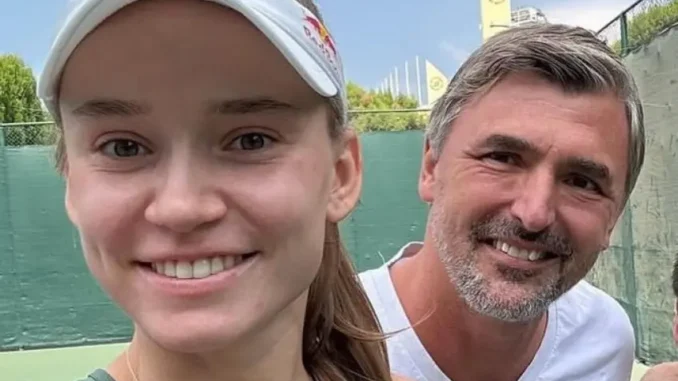
In a dramatic escalation of one of tennis’s most contentious sagas, Stefano Vukov, the long-time coach of 2022 Wimbledon champion Elena Rybakina, has launched an appeal to overturn a one-year suspension imposed by the Women’s Tennis Association (WTA) for alleged abusive conduct. The ban, confirmed in February 2025 following an independent investigation, has barred Vukov from coaching at WTA events, accessing player facilities, or obtaining tournament credentials. Yet, the 38-year-old Croatian remains defiant, pursuing arbitration to challenge the ruling while continuing to work with Rybakina outside of official tournaments. This ongoing controversy has cast a shadow over Rybakina’s stellar 2025 season, raising questions about player-coach dynamics and the WTA’s commitment to player welfare.
The investigation into Vukov’s conduct began after Rybakina briefly parted ways with him in August 2024, only to reinstate him before the 2025 Australian Open. The WTA’s probe, prompted by concerns from Rybakina’s inner circle, including her family and fellow coaches, uncovered disturbing allegations of verbal and psychological abuse. Reports detailed Vukov’s use of derogatory language, including calling Rybakina “stupid” and “retarded,” and claiming she would be “picking potatoes” in Russia without him. One particularly shocking incident involved Vukov allegedly flooding Rybakina’s phone with over 100 calls and numerous texts after being sacked, even pursuing her through the hallways of her Manhattan hotel before the 2024 US Open. “No one offered any support,” Rybakina said emotionally in Dubai, reflecting on the lack of solidarity from WTA peers amid the controversy. “Honestly don’t need. There is couple players I’m in touch more. But to say that I have very, very close friends on tour, it’s I think not true just because we competing against each other.”
Despite these allegations, Rybakina has staunchly defended Vukov, insisting he “never mistreated me” and expressing frustration with the WTA’s decision. “I don’t agree with a lot of things that the WTA do in the sense of my relationship with Stefano,” she stated before the Australian Open, criticizing the investigation process. The pair’s relationship, which began in 2019 and led to Rybakina’s meteoric rise to World No. 3 and a Wimbledon title, is reportedly more than professional, with suggestions of a romantic involvement. This dynamic has complicated the narrative, with former player Barbara Schett accusing Vukov of “brainwashing” Rybakina, citing his influence as a “disaster” for the 25-year-old Kazakh star. “We know that she has major ups and downs mentally, probably because of him,” Schett said, echoing concerns from others in the tennis community.
Vukov’s suspension prevents him from coaching Rybakina during tournaments, but he continues to train her between events, a loophole that has sparked debate. “We usually train together between tournaments, not when the tournament is on,” Rybakina clarified at the French Open, where she reached the fourth round and faces Jelena Ostapenko next. Vukov also now acts as her agent, reportedly exploring commercial opportunities for Rybakina, further entwining their professional and personal lives. This arrangement has drawn criticism, with tennis insider Ben Rothenberg comparing it to another player’s suspension for working with a banned coach, highlighting the WTA’s strict stance on player welfare.
The appeal, filed through arbitration as required by WTA rules, seeks to overturn the ban by February 21, 2026, though Vukov faces an uphill battle. The investigation’s findings, detailed in a confidential letter from WTA CEO Portia Archer, described a “toxic” relationship marked by “abusive conduct” that compromised Rybakina’s psychological and emotional well-being. Former coaches like Rennae Stubbs, who faced legal threats from Vukov for criticizing his behavior, and Pam Shriver have publicly condemned his methods. “He definitely abused her mentally and that’s why I think it’s right that he was banned,” Schett added, reflecting a broader sentiment among tennis figures.
Rybakina’s 2025 season has been a mix of triumph and turmoil. Her victory at the WTA 500 in Strasbourg, her first title in over a year, showcased her resilience, culminating in a 6-1, 6-7(2), 6-1 win over Ludmila Samsonova. Yet, the shadow of Vukov’s suspension looms large. After parting with Goran Ivanišević, who briefly coached her post-Australian Open, Rybakina now works with Davide Sanguinetti during tournaments. “Stefano and I talk a lot, we are on the same wavelength,” Sanguinetti said, acknowledging Vukov’s ongoing influence. Rybakina’s emotional press conferences, particularly in Dubai where she admitted feeling isolated, reveal the toll of the controversy. “I have a couple of good friends, let’s say,” she noted, but emphasized the competitive nature of the tour limits deeper connections.
As Vukov’s appeal unfolds, the tennis world watches closely. The case underscores the WTA’s efforts to protect players, but Rybakina’s loyalty to Vukov complicates the narrative. Her recent performances, including a six-match winning streak before Roland Garros, prove her talent remains undimmed, but the off-court drama threatens to overshadow her achievements. Whether Vukov’s appeal succeeds or not, this saga highlights the delicate balance between personal relationships, professional success, and the sport’s evolving standards of conduct.
Long article with no proof of anything .All rumors